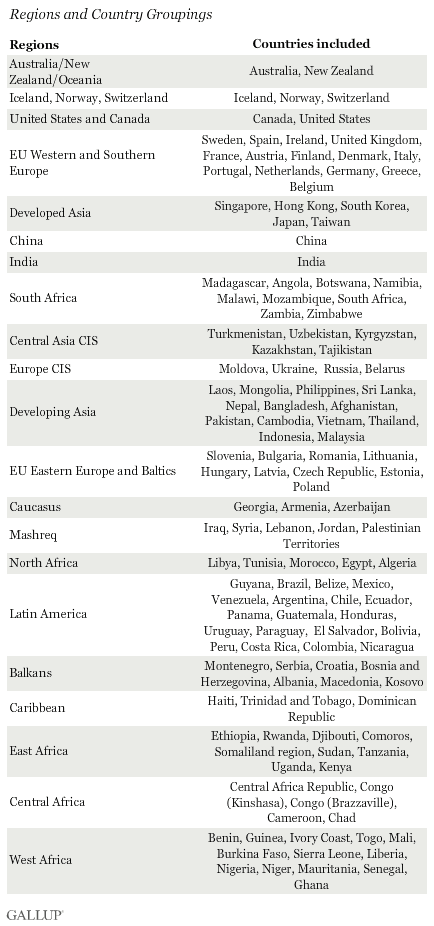WASHINGTON, D.C. -- If all adults worldwide who would like to migrate actually left and moved where they want to, Gallup's Potential Net Youth Migration and Potential Net Brain Gain indexes show highly developed countries would see an influx of young people rather than educated people. Only developed Asia would see significant brain drain.
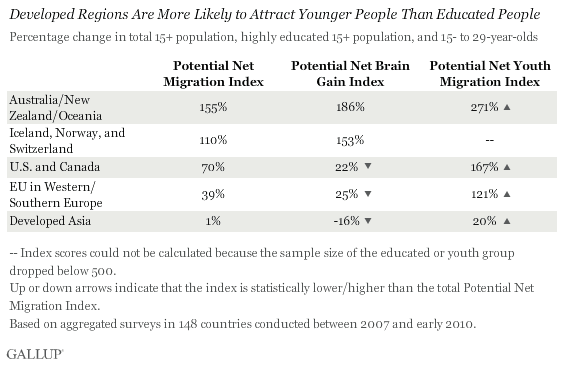
These results are based on Gallup surveys of the migration desires of nearly 350,000 adults in 148 countries between 2007 and early 2010. Gallup created three indexes -- the Potential Net Migration Index, Potential Net Brain Gain Index, and Potential Net Youth Migration Index -- to gauge the likely changes to the population if people who say they would like to migrate permanently actually move where they want. The higher the index score, the larger the potential net population gain. Negative scores indicate net population loss.
The Potential Net Migration Index measures the total potential net change to the adult population by subtracting those who would like to move out of a country from those who would like to move into a country. The Potential Net Brain Gain Index is calculated with a similar approach and measures the potential net change to the adult population with four or more years of education after high school or the equivalent of a bachelor's degree or higher. The Potential Net Youth Migration Index measures the net change to the 15- to 29-year-old population.
United States Attracts Less Educated
The United States and Canada -- two of the top desired destination countries in the world for potential migrants -- are poised to experience higher youth gains than education gains. The Potential Net Brain Gain score of 12% in the United States, however, is relatively small compared with its Potential Net Migration Index, which indicates that this country would likely attract more people but not necessarily more educated people.
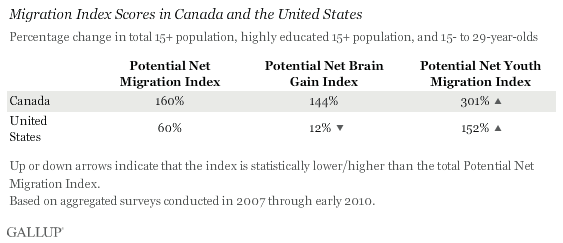
European Union Brain Gain or Drain?
Most developed EU countries in Western and Southern Europe, too, are more attractive to young potential migrants than those who are the most educated. Although they potentially could see education gains from migration, countries such as the United Kingdom, with a relatively low Potential Net Brain Gain Index score of 13% and a relatively high Potential Net Youth Migration Index score of 235%, are particularly unattractive to the most educated. However, only Portugal and Belgium would see significant brain drain.
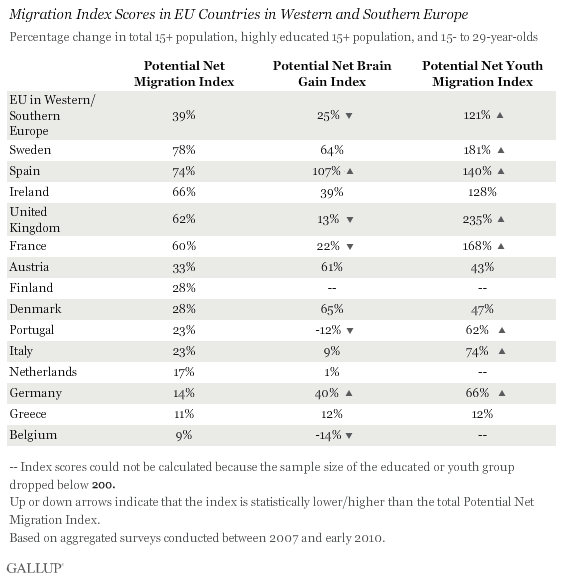
Spain and Germany, on the other hand, stand out among these EU countries because they attract disproportionately high levels of educated people and younger people, compared with the size of their total potential adult population increase.
Developed Asia Poised to Lose Most Educated
Developed Asia's relatively low Potential Net Migration Index score suggests its total adult population would not change much from migration. Its negative Potential Net Brain Gain Index score, however, suggests that the region would lose a significant portion of its most educated people. In fact, with the exception of Singapore, countries in the region all post negative Potential Net Brain Gain scores.
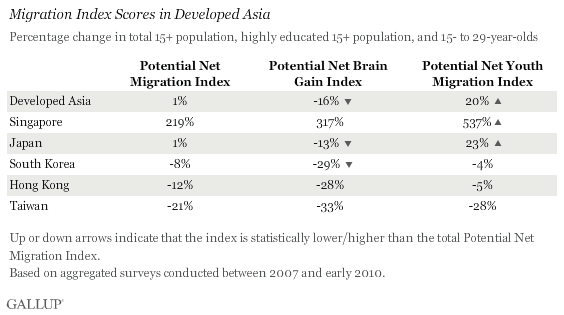
That more young people want to move to Japan and Singapore than want to leave those countries, however, is good news because they have among the fastest aging populations and lowest fertility rates in the world.
In Developing Regions, Potential Population Losses Across the Board
Everywhere else in the world, populations could potentially experience losses in every area -- particularly among youth. Latin America, for example, would see similar losses in its total adult population and its most educated population, but losses among youth would be significant. Latin America's -27% score on the Potential Net Youth Migration Index means it could lose as many as 35 million young people. Only India could potentially face brain drain; its Potential Net Brain Gain Index (-18%) is significantly lower than its Potential Net Migration Index (-6%).
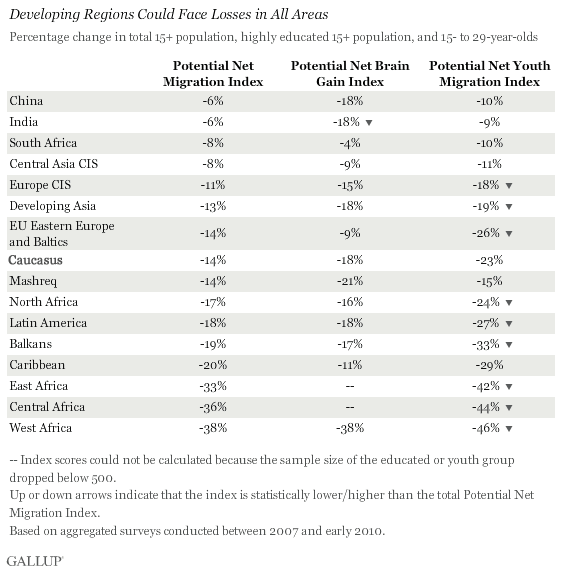
Implications
While Gallup's findings reflect people's aspirations rather than their intentions, the implications of what could happen if hypothetical desires became reality are serious considerations for leaders to think about as they plan development and migration strategies now and in the future. Gallup will continue to monitor trends in desired migration and will publish updated index results in 2011.
For the complete index results on all countries surveyed, see page 2.
For complete data sets or custom research from the more than 150 countries Gallup continually surveys, please contact SocialandEconomicAnalysis@gallup.com or call 202.715.3030.
Survey Methods
Results are based on telephone and face-to-face interviews with 347,717 adults, aged 15 and older, in 148 countries from 2007 to early 2010. The 148 countries surveyed represent about 95% of the world's adult population. For most countries, aggregated sample sizes (across multiple years of surveys) range between 1,000 and 4,000 interviews. A total of 8,196 interviews were conducted in India, 7,561 in China, and 7,010 in Russia. As with any survey-based estimate, the indexes reported in this article have corresponding margins of error, calculated using the Standard Error of the index. Sample size, size of the country, and range in population projection weights affect margin of error of the indexes.
Gulf Cooperation Council countries are excluded from these analyses, as only Arab nationals and Arab expatriates were surveyed. Potential Net Migration Index scores are not reported for subregions/countries with a total sample size less than 500 because of the volatility in the index as measured by the margin of error. Potential Net Brain Gain and Potential Net Youth Migration indexes are not reported for subregions with a sample size less than 500 and are not reported for countries with a sample size less than 200.
The Potential Net Migration Index is measured on a scale of -100 (meaning the total adult population of the country would leave) to infinity (meaning the potential inflow of adult population to the country is unlimited and depends on the number of adults who want to move in from around the world).
The Potential Net Brain Gain Index is measured on a scale of -100 (meaning the total population of highly educated residents -- those who have completed four years of education beyond high school or have the equivalent of a bachelor's degree -- would leave) to infinity (meaning the potential inflow of this highly educated group is unlimited and depends on the number who want to move in from around the world).
The Potential Net Youth Migration Index is measured on a scale of -100 (meaning the total aged 15 to 29 population of the country would leave) to infinity (meaning the potential inflow of 15- to 29-year-olds is unlimited and depends on the number who want to move in from around the world).
The index for each subregion/country and range at the 95% confidence level are presented in the table on page 2. For example, the Potential Net Migration Index for El Salvador is estimated at -45%, meaning if all adults who desire to move in and out of the country did so, the adult population would decline by 45%. With the margin of error at the 95% confidence level, this estimate ranges from -48% to -43%. Gallup estimates that Singapore's adult population would increase 219%, and with the margin of error, this estimate ranges from +168% to +270%.
Gallup's migration indexes are based on responses to the following questions:
Ideally, if you had the opportunity, would you like to move permanently to another country, or would you prefer to continue living in this country?
(If "would like to move permanently to another country") To which country would you like to move? [Open-ended, one response allowed]


